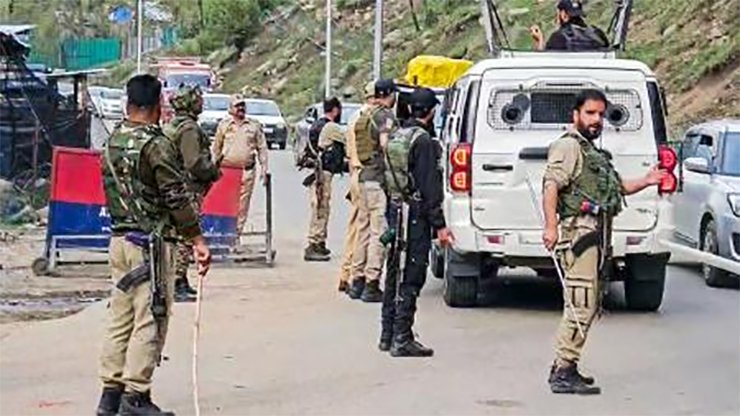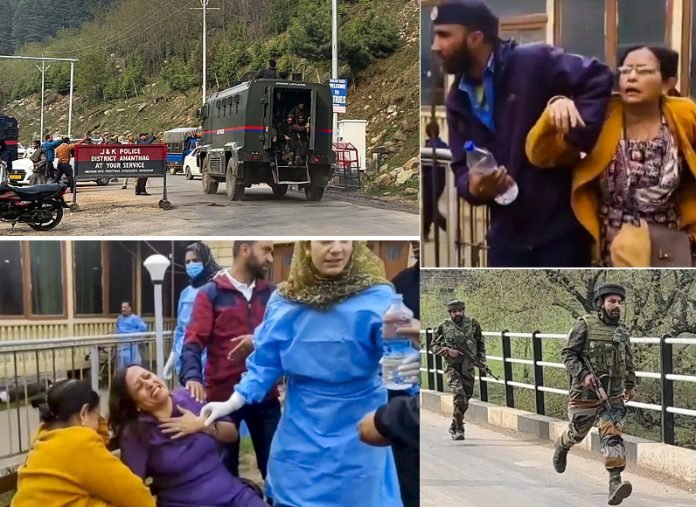The Incident: On April 22, 2025, a horrific terrorist attack unfolded in the Baisaran meadow near Pahalgam in Jammu and Kashmir’s Anantnag district. Militants affiliated to The Resistance Front (TRF), an offshoot of the Pakistan-based Lashkar-e-Taiba, targeted a group of tourists, killing at least 28 civilians and injuring over 20 people. This attack was one of the deadliest assaults on civilians in India since the 2008 Mumbai attacks.
The assailants, numbering between four and six (as reported), deliberately singled out non-Muslim tourists, subjecting them to religious coercion by forcing them to recite Islamic verses (Kalma) and checking for circumcision before executing them. Witness accounts confirm that Hindu men were systematically shot, while some were spared solely to ‘narrate the horror’ to authorities. This brutality not only violated the basic tenets of humanity but was strategically designed to incite terror and discord among the civilian population.
This brutal event underscored a growing trend of religiously motivated violence in the region, with previous attacks often targeting religious minorities. The chilling nature of this massacre, with its precise, methodical, and discriminatory execution, presents a disturbing shift in terrorist tactics aimed at undermining peace and stability in the region.
Government Response
The Indian government responded swiftly, with Prime Minister Narendra Modi cutting short his foreign visit to Saudi Arabia and Home Minister Amit Shah travelling to Srinagar to oversee the situation. The National Investigation Agency (NIA) launched an investigation, releasing sketches of three suspects linked to Lashkar-e-Taiba.
Despite the immediate actions taken by the Indian government, this attack has raised more questions regarding the effectiveness of counter-terrorism measures, particularly in tourist hotspots that have long been targeted for political and religious reasons. The violence perpetrated in Pahalgam not only jeopardised national security but also dealt a severe blow to the state’s fragile tourist economy, which many local families rely on for their livelihood.
The assailants singled out non-Muslims, subjecting them to religious coercion by forcing them to recite Islamic verses and checking for circumcision before executing them. Witnesses confirm that Hindu men were systematically shot. This brutality violated the basic tenets of humanity and was designed to incite terror and discord among people
Human Rights and Constitutional Violations
The attack constitutes egregious violations of international human rights law, especially in the context of the Universal Declaration of Human Rights (UDHR), 1948, and the International Covenant on Civil and Political Rights (ICCPR), 1966. These legal frameworks explicitly prohibit the deliberate killing of civilians, as reflected in Articles 3 and 6 of the UDHR and ICCPR, respectively. Furthermore, the selective targeting based on religion underscores a discriminatory intent, violating the prohibition of discrimination as outlined in Article 2 of the UDHR and Article 26 of the ICCPR.
The psychological terror inflicted on survivors and the brutal executions also qualify as cruel and degrading treatment under Article 5 of the UDHR and Article 7 of the ICCPR. Additionally, under the Geneva Conventions, even in non-international conflicts, violence against civilians is strictly prohibited. This attack can therefore be classified as a ‘war crime’, perpetrated with the explicit aim of terrorising people.

Genocidal Indicators under International Law
The attack raises alarming concerns under the UN Genocide Convention (1948), particularly Article II, which defines genocide as acts committed with the intent to destroy, in whole or in part, a religious or ethnic group. The assailants’ methodology — religious vetting, systematic executions, and forced messaging to instill terror — suggests genocidal intent. Several key elements of genocide are evident:
- Killing members of tourists’ group: The assailants specifically targeted non-Muslims, with the most brutal killings directed at Hindu men.
- Causing serious bodily/mental harm: Survivors endured not only physical injuries but profound psychological trauma as they were forced to witness the massacre of their fellow travellers.
- Inflicting conditions to destroy the group: The attack created an environment where non-Muslim communities feel unsafe to travel to or even reside in Kashmir, thus exacerbating the social divide.
The Pahalgam attack has not yet been formally classified as genocide, but it fits a pattern of targeted violence that warrants an investigation by the International Criminal Court to determine if it meets the threshold for ‘crimes against humanity or genocide’. Concrete steps must be taken to prevent future occurrences and promote lasting peace in the region
While the attack has not yet been formally classified as genocide, it fits a pattern of targeted violence that warrants thorough investigation by international bodies like the International Criminal Court (ICC) to determine if it meets the threshold for ‘crimes against humanity or genocide.’
Global Condemnations and Legal Obligations
The international community, including UN Secretary-General António Guterres, the US, the UK, EU, and the UAE, condemned the attack, reinforcing the universal rejection of terrorism. As a signatory to global counter-terrorism conventions, India has the right to seek international cooperation in prosecuting the perpetrators. In addition to global condemnations, Home Minister Amit Shah and Defence Minister Rajnath Singh assured the nation that not only the perpetrators of this act will be brought to justice, but also the actors behind the scenes.
The Indian government has reiterated its commitment to upholding the rule of law by emphasising that the attack will be met with rigorous legal action under India’s counter-terrorism laws. However, this tragedy underscores the need for stronger international legal mechanisms that go beyond national borders, allowing countries to address cross-border terrorism effectively.
The Role of International Law and Institutions
In addressing terrorism and related atrocities, international legal institutions such as the UN, the International Court of Justice (ICJ), and the ICC must play a crucial role in holding individuals and states accountable. India has a strong legal framework, but it must now advocate for more robust international cooperation and enforcement to tackle terrorism that exploits religious and ethnic divides. The Pahalgam massacre highlights the need for a renewed focus on countering religious extremism through multilateral efforts.
As a signatory to global counter-terrorism conventions, India has the right to seek international cooperation in prosecuting the perpetrators. The UN, the International Court of Justice, and the ICC must play a crucial role in holding individuals and states accountable. India must advocate for international cooperation to tackle terrorism that exploits religious and ethnic divide
At the same time, India’s internal legal system must remain vigilant, ensuring that these violations are prosecuted under domestic terrorism laws. Equally important is the role of civil society organisations, which must continue to advocate for justice, healing, and reconciliation for the survivors and the affected families.

Conclusion: Upholding Human Dignity and Justice
The Pahalgam massacre is not just a terrorist act but a systematic assault on human rights, constitutional values, and the principle of dignity. The Indian government must ensure accountability through rigorous legal action under anti-terror laws and international legal mechanism, while strengthening protections for vulnerable communities in terrorist-affected areas.
The attack underscores the urgent need to safeguard the right to life with dignity and uphold India’s constitutional and international obligations to prevent such atrocities in the future. In the face of such violence, the international community must stand united in demanding justice, and in ensuring that perpetrators of these heinous acts are held accountable for their actions.
The Pahalgam massacre may have taken place on Indian soil, but its implications reach far beyond the borders of Jammu and Kashmir, affecting the entire international community. As nations across the globe unite in condemnation, concrete steps must be taken to prevent future occurrences and promote lasting peace in the region.







